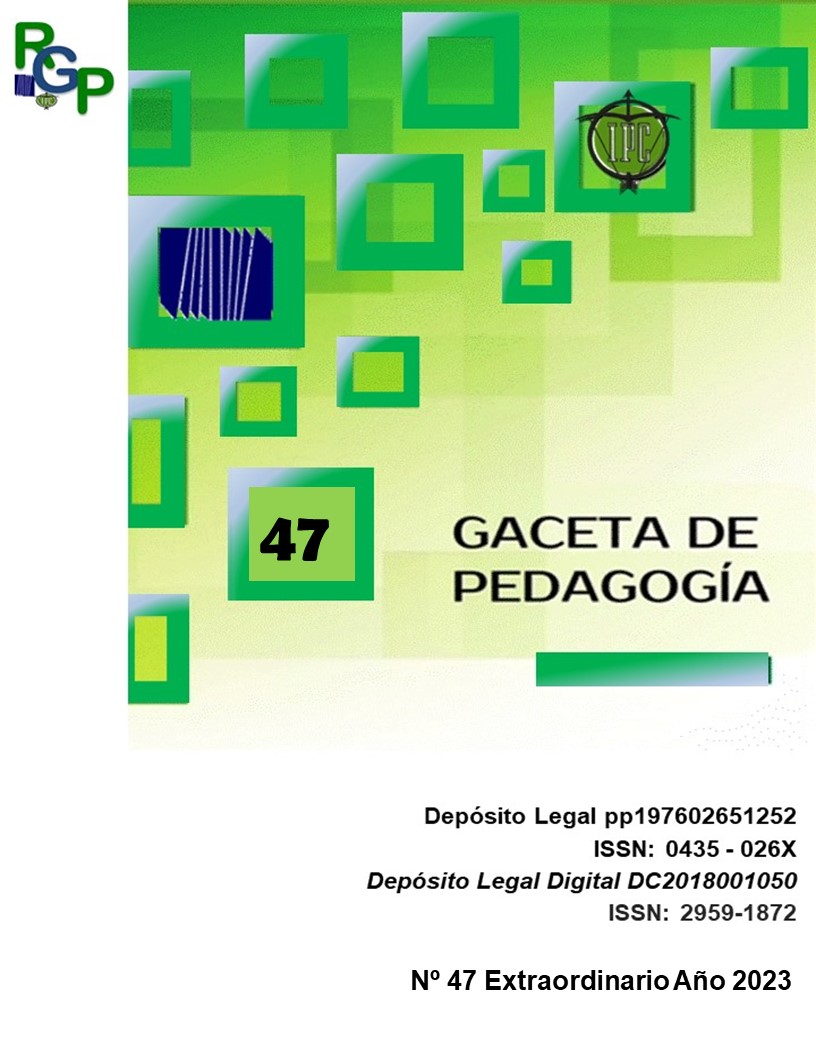The pedagogical anecdote: a heuristic tool from Max Van Manen perspective
DOI:
https://doi.org/10.56219/rgp.vi47.2343Keywords:
Phenomenology of educational practice, Max Van Manen, Modality of phenomenological methodAbstract
A qualitative research framed in the interpretative paradigm is presented whose purpose was to show in the husserlian sense the procedure to implement the hermeneutic phenomenological method of Max Vanen’s educational practice which deals with a phenomenological research modality focused in education. The anecdote technique was used provide by a secondary Social Science teacher which following the vanmanian approach served as starting point to apply the method. It was found that the conflictive pedagogical situation is summmarised in one sentence: I apologize to them and the topics tan supported it were: Listening and pedagogical negotation. Added two casual topics: Rubric usage and third party opinion. The provisional conclusions are grouped into: a)scope and limitations of the method b) the articulation of the process and c)the projection of the penomenological text on the reader.
References
Aranguren, G. (2022). Escuela inteligente y el desarrollo de habilidades blandas. Revista Educare. 26(2) p.p 403–428. https://doi.org/10.46498/reduipb.v26i2.1627
Ayala, R. (2008). La metodología fenomenológica hermeneútica de Van Manen en el campo de la investigación educativa. Revista de Investigación Educativa 26 (2). pp. 409-430. https://acortar.link/10MdJE
Ayala, R. (2016). La relación pedagógica en las fuentes de la experiencia educativa con Van Manen. Rev. complut. educ. 29 (1). Pp 27-41. https://acortar.link/AA5oYD
Bandura, A. (1982). Self eficacy mechanism in human agency American Psycologist, 37(1), pp 122-147. https://psycnet.apa.org/record/1982-25814-001
Embree, L. (2003). Reflective analysis. Zeta Books.
Extremera, N y Fernández, P. (2004). La importancia de desarrollar la inteligencia emocional en el profesorado. Revista iberoamericana de educación 34 (3). pp1-9. https://rieoei.org/RIE/article/view/4005
Fuster, D; Gálvez, E y Pisfil, E. (2018). Estudio fenomenológico: La confianza docente en la práctica pedagógica. Revista, UCV. Scientia. 10 (1). Pp 93-98 https://acortar.link/N47ydi
Fuster, D. (2019). Investigación cualitativa Método fenomenológico hermenéutico. Propósitos y representaciones 7(1). pp. 201 – 229 https://acortar.link/LEPfSQ
Funes, S. (2000). Resolución de conflictos en la escuela: Una herramienta para la convivencia. Contextos educativos 3. Pp 91–106. https://acortar.link/jmYZVx
Gadamer, H. (1999). Verdad y Método. Tomo I. Salamanca: Sígueme. https://acortar.link/XfT3JS
Giorgi, A. (1991). Phenomenology and psychological research. Duquese. University Press.
Galvis, S. (2016). Y les habló muchas cosas por parábolas: Un recurso pedagógico para la formación de profesores. https://acortar.link/jjikqB
Ibarra, G. (2016). El tacto pedagógico: Una propuesta de la enseñanza ética. Redipe Revista Virtual 10 (5) pp 17-26.
Jordán, J. (2015). La responsabilidad ética pedagógica de los educadores: Una mirada desde Max Van Manen. Revista Española de Pedagogía. Nº 261, pp 381-396. https://acortar.link/aPSuOp
Leal, N. (2001). Aproximación fenomenológica a las razones por las cuales la población femenina desea ingresar a la UNA. Informe de Investigaciones Educativas XV(1 y 2).
Levine, D. (1997). Social Theory as a vocation: Engaging with future challenges. Perspectives, 19 (2), 1-8.
Moustakas, C. (1994). Phenomenological research methods. Sage.
Picón, G. (2009). Desarrollo experimental de una comunidad de investigadores en el contexto universitario. Cap. 1. En: Investigación y cambio en Educación desde una perspectiva crítica. Caracas: Ediciones del Vicerrectorado de Investigación y postgrado.
Spiegelberg, H. (1982). The phenomenological movement. Hague Martinus Nijhoff.
Sanz, M; Almagro, M; y Galian, B. (2017). Opinión del alumnado sobre el empleo de rúbricas en la Universidad. Estudios pedagógicos. XLIII (2). pp: 93-113. http://www.scielo.cl/scielo.php?script=sci_arttext&pid=S0718-07052017000200005
Van Manen, M. (2003). Investigación Educativa y experiencia vivida. Idea Books.
Van Manen, M (1998). El tacto pedagógico. El significado de la sensibilidad pedagógica. Barcelona: Paidós
Published
How to Cite
Issue
Section
License

This work is licensed under a Creative Commons Attribution-NonCommercial-NoDerivatives 4.0 International License.

